Have you ever walked through a vibrant market, filled with delicious smells? Picture Abidjan, where street food makes the city come alive. One popular dish that you must try is attieke.
Attieke is a tasty treat made from cassava. It is often served with fresh fish or spicy sauces. It’s a favorite among local families and visitors alike. But what makes it so special?
Imagine sitting at a small table, laughter filling the air, as vendors cook right in front of you. The sizzle of food and the bright colors all around create a lively scene. It’s more than just a meal; it’s an experience!
Did you know that attieke has a long history in Ivory Coast? Many believe it dates back hundreds of years. This delicious dish connects families and friends, bringing them closer together.
So, why not take a bite of Abidjan’s attieke street food? You might just discover your new favorite dish!
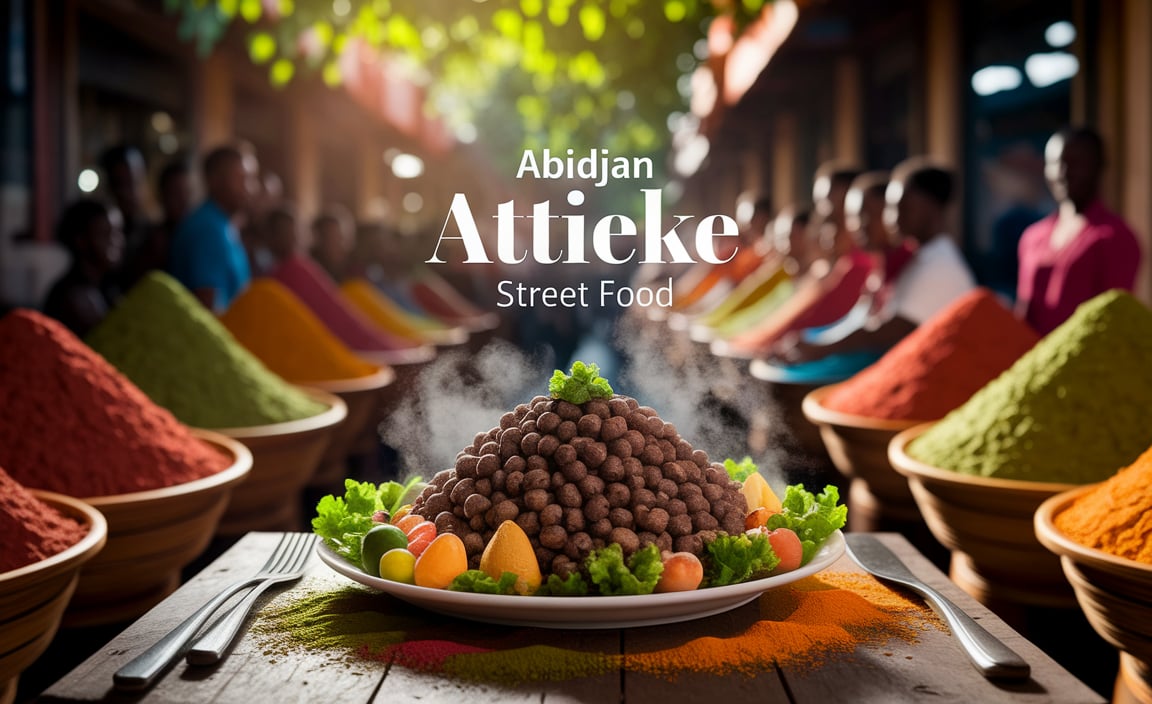
Discover Abidjan Attieke: The Ultimate Street Food Experience
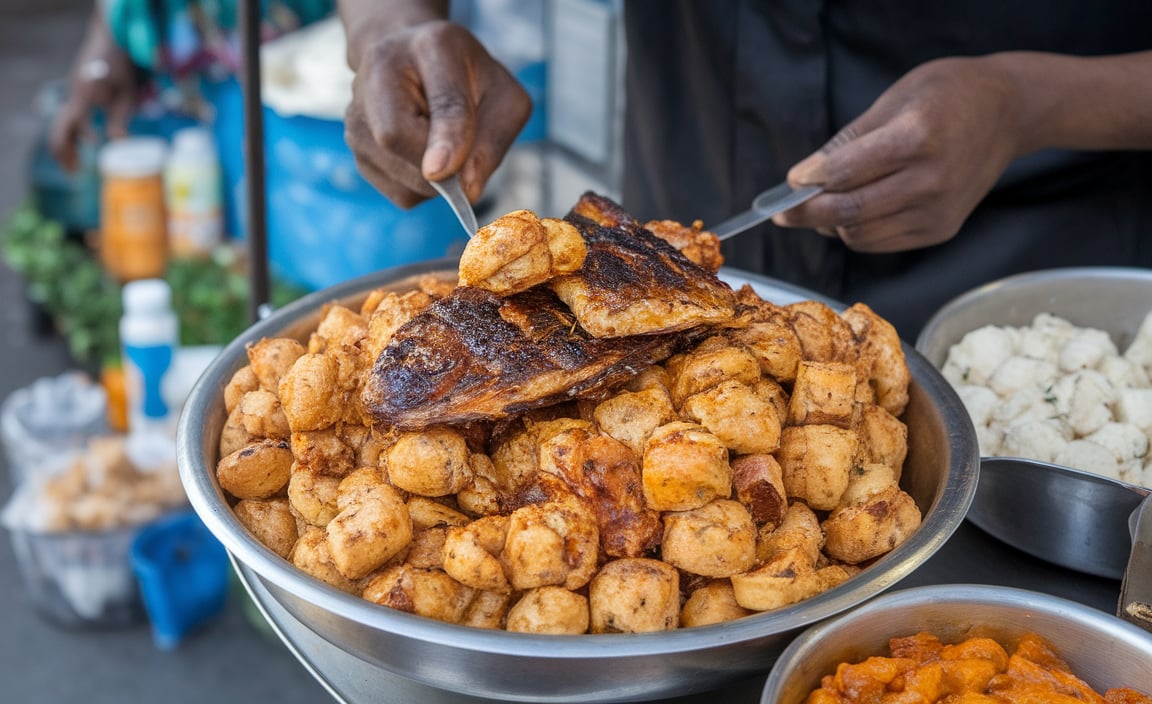
Abidjan’s street food scene is vibrant and tasty, especially attieke. This delicious dish is made from fermented cassava, giving it a unique flavor. Vendors serve attieke with grilled fish or spicy sauces, offering a burst of flavors. Did you know attieke is both nutritious and filling? Locals enjoy it every day, making it a staple. Exploring the streets of Abidjan, you can find friendly sellers ready to share their culinary treasures. Why not try some attieke on your next adventure?
What is Attiéké?
Definition and origin of Attiéké. Key ingredients and preparation methods.
Attiéké is a delicious Ivorian dish made from fermented cassava. Originating from Côte d’Ivoire, it has become a popular street food in Abidjan. To prepare it, cassava is grated, fermented, and steamed, transforming it into a fluffy, grainy side dish. This culinary delight can pair well with grilled fish, spicy sauce, or vegetables, making it a perfect treat for adventurous eaters. So next time you’re in Abidjan, grab some attiéké and enjoy a taste of sunshine!
| Key Ingredients | Preparation Method |
|---|---|
| Cassava | Grated and fermented |
| Water | Steamed to fluffy perfection |
| Spices (optional) | Mixed with accompaniments |
Popular Attiéké Dishes in Abidjan
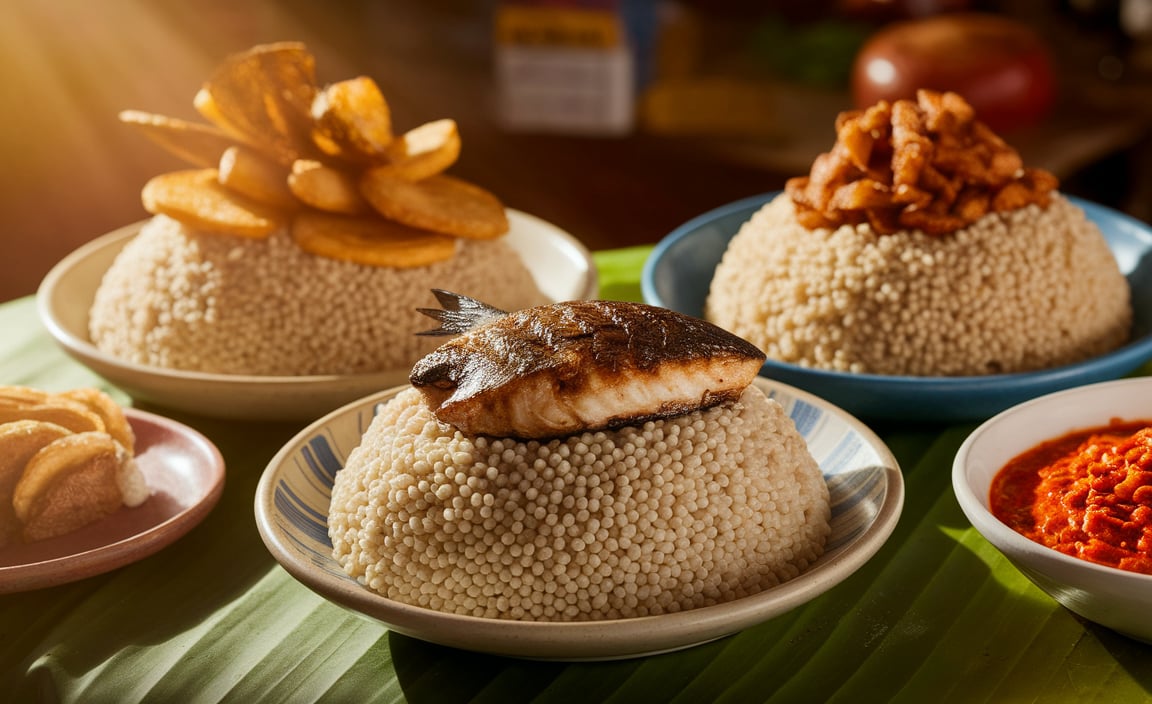
List of signature dishes featuring Attiéké. Descriptions of flavors and textures.
In Abidjan, attiéké delights many taste buds with its wonderful dishes. Here are some favorites:
- Attiéké with Grilled Fish: This dish mixes the softness of attiéké with tasty, grilled fish. The fish is smoky and full of flavor.
- Attiéké with Fried Plantains: Sweet plantains add a crunchy contrast to the smooth attiéké. It’s a popular choice!
- Attiéké with Spicy Sauce: This dish is lively and has a spicy kick. The sauce makes it exciting to eat.
Each dish offers a unique mix of textures and flavors. The soft grains of attiéké are perfect with crispy sides or spicy sauces. Enjoying these meals is a fun experience!
What is attiéké?
Attiéké is a dish made from fermented cassava. It is often served with grilled meats, fish, or vegetables. It has a light, fluffy texture and a slightly tangy taste that many adore!
Where to Find the Best Attiéké in Abidjan

Recommended street food vendors and stalls. Tips on finding hidden gems in the city.
In Abidjan, the best attiéké can be found at local street food vendors. Look for busy stalls; that usually means great food. Here are some top spots:
- Yamoussoukro Food Stand
- Attiéké Delights near the university
- Plateau Street Market
To discover hidden gems, stroll through neighborhoods. Ask locals where they eat. You might find a small stall with delicious attiéké. Many locals love to share their favorites. Happy eating!
Where can I find the best attiéké in Abidjan?
Check popular street vendors, bustling markets, and ask locals for their top picks. Street stalls with many customers are often gold mines for tasty food!
Health and Safety Considerations
Food safety practices for street food. How to choose safe dining options.
Street food can be delicious, but safety is key! Before diving into that yummy attieke, check if the vendor practices good hygiene. Look for clean carts and fresh ingredients. If they’ve got a long line, that’s a good sign—they must be doing something right! Also, avoid anything that’s been sitting out too long. Remember: food shouldn’t come with a side of germs!
| Safety Tip | Description |
|---|---|
| Freshness | Grab food made right before your eyes! |
| Cleanliness | If the stall is messy, keep walking! |
| Lines | Long lines often mean tasty food! |
Keep these tips in mind and enjoy your Abidjan adventure with a full tummy and a happy heart!
Vegetarian and Vegan Attiéké Options
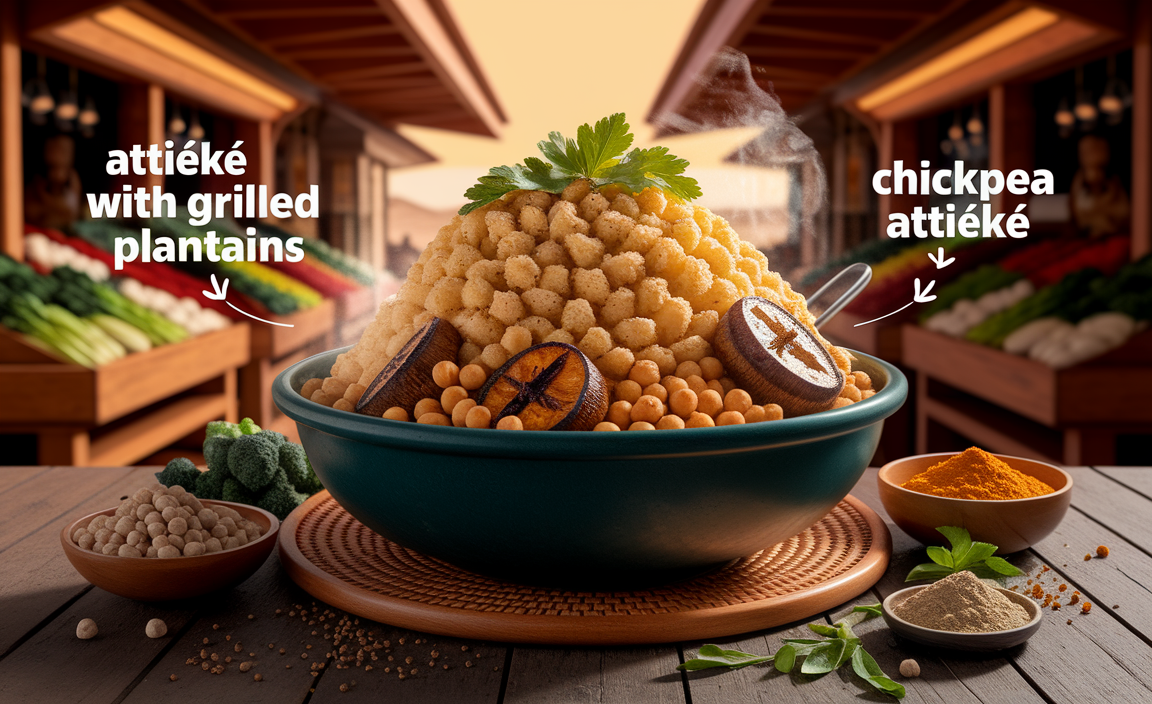
Availability of plantbased versions. Popular vegetarian dishes incorporating Attiéké.
In Abidjan, finding plant-based options is as easy as spotting a toucan! Vegans and vegetarians can enjoy attiéké in many tasty ways. This fermented cassava dish pairs perfectly with fresh veggies or spicy sauces. Popular choices include attiéké with grilled plantains, or a warm veggie salad. Plus, many vendors offer mouthwatering toppings like chickpeas or avocado. Eating well never tasted so good! Just remember: always ask for the vegetarian options when you see those colorful stalls!
| Dish | Ingredients |
|---|---|
| Attiéké with Grilled Plantains | Attiéké, plantains, spices |
| Veggie Salad | Attiéké, lettuce, tomatoes, beans |
| Chickpea Attiéké | Attiéké, chickpeas, onion |
Cultural Significance of Attiéké in Ivorian Society
Role of Attiéké in social gatherings and celebrations. Connection to Ivorian identity and heritage.
Attiéké holds great importance in Ivorian culture. It brings friends and family together during celebrations. People enjoy it at weddings, holidays, and other gatherings. This food connects people to their roots and shared identity. It is not just a meal; it is a symbol of togetherness.
- Served at birthday parties
- Popular during community events
- Part of traditional festivals
Attiéké shows the rich heritage of Ivory Coast. Each bite tells a story and reminds people of their history.
Why is attiéké important in Ivorian culture?
Attiéké is a key dish that reflects Ivorian identity. It unites people and honors traditions.
Tips for Experiencing Street Food Like a Local
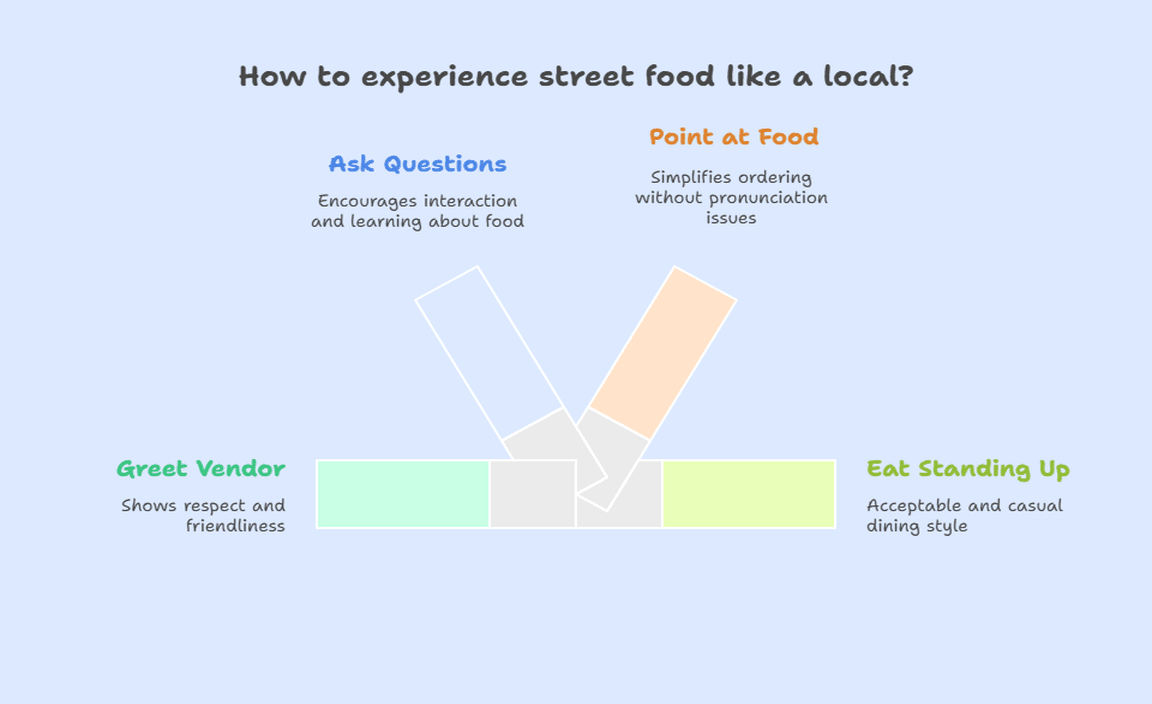
Etiquette and customs when eating out. How to approach vendors and order food.
Trying street food can be an exciting adventure! First, always greet the vendor with a smile. It shows respect and friendliness. When ordering, don’t hesitate to ask questions. Vendors love sharing their tasty creations— it’s like getting a mini-food lecture! Remember to point if you can’t pronounce the dish—it works better than a tour guide! Eating standing up is totally cool; just try not to drop your food. Pro tip: following local customs makes the experience even tastier!
| Tip | Description |
|---|---|
| Greet the Vendor | Saying hello brings a smile and shows respect. |
| Ask Questions | Vendors love to talk about their food! |
| Don’t Be Shy | Pointing works better than struggling with pronunciation. |
| Eat Standing Up | It’s perfectly acceptable; just avoid food casualties! |
Pairing Attiéké with Drinks
Popular beverages that complement Attiéké. Traditional drinks to try alongside street food.
Attiéké tastes great with various drinks. Popular choices include refreshing beverages that enhance its flavors. Here are some traditional drinks to enjoy with street food:
- Bouye: A sweet baobab juice that is fruity and tangy.
- Ginger Beer: This spicy drink gives a zesty kick.
- Palm Wine: A unique, slightly sweet drink made from palm sap.
Trying these drinks with attiéké makes for a delightful meal. You’ll enjoy tasty combinations and discover new flavors!
What is a good drink to have with attiéké?
The best drinks to pair with attiéké are ginger beer and buoye, for their unique flavors and refreshing qualities.
Conclusion
In conclusion, Abidjan is famous for its delicious attieke street food. You can enjoy tasty dishes made from fermented cassava. Explore local stalls to taste fresh flavors and learn about Ivorian culture. Next time you’re in Abidjan, try attieke! It’s a fun way to experience the city’s vibrant food scene and create lasting memories. Happy eating!
FAQs
Sure! Here Are Five Related Questions On The Topic Of Attiéké Street Food In Abidjan:
Attiéké is a yummy dish from Abidjan, made from fermented cassava. You can find it easily on the streets. People love to eat it with grilled fish or meat. It has a special taste and is very colorful. Trying Attiéké is a fun way to enjoy Ivorian street food!
Sure! Just go ahead and ask your question, and I’ll do my best to give you a short and clear answer.
What Is Attiéké, And How Is It Traditionally Prepared In Abidjan?
Attiéké is a tasty dish from Ivory Coast, especially popular in Abidjan. It is made from fermented cassava, which is a root vegetable. To prepare it, people first peel and grate the cassava. Then, they let it sit to ferment for a few days before steaming it. Finally, we serve attiéké with fish, vegetables, or sauce.
Where Can One Find The Best Street Vendors Selling Attiéké In Abidjan?
You can find the best street vendors selling Attiéké in Abidjan at Treichville and Cocody. These areas have many food stalls. The vendors there are friendly and offer tasty Attiéké. You can enjoy it with grilled fish or meat. It’s a fun experience to eat outside!
What Are Common Side Dishes Or Accompaniments Served With Attiéké In Abidjan Street Food Culture?
In Abidjan, we often eat Attiéké with tasty side dishes. You can enjoy it with grilled fish or meat. People also like spicy sauce on top. Sometimes, we add salad made of onions and tomatoes. It’s a yummy mix of flavors!
How Has The Popularity Of Attiéké Evolved Among Both Locals And Tourists In Abidjan?
Attiéké is a popular dish in Abidjan, which is the biggest city in Ivory Coast. Locals love eating it with fish and sauce. Tourists have also discovered Attiéké and enjoy trying it. Many restaurants now serve it because everyone likes it so much. This makes Attiéké a favorite for both local people and visitors!
What Are Some Tips For Trying Attiéké Safely At Street Stalls Or Markets In Abidjan?
To try Attiéké safely at street stalls, choose busy places. This shows the food is fresh. Look for clean tables and nice smells. Always ask if the food is hot or freshly made. You can also drink bottled water to stay safe!
Resource:
-
History of Cassava in West Africa: https://www.britannica.com/plant/cassava
-
West African Street Food Culture: https://theculturetrip.com/africa/articles/a-foodie-s-guide-to-west-africa/
-
Tips for Eating Street Food Safely: https://www.cdc.gov/foodsafety/travelers.html
-
Plant-Based Eating in Africa: https://africanveganonabudget.com/plant-based-african-recipes/